-
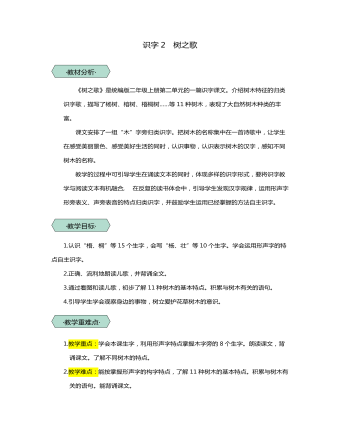
统编版二年级语文上识字2树之歌教学设计教案
《树之歌》是统编版二年级上册第二单元的一篇识字课文。介绍树木特征的归类识字歌,描写了杨树、榕树、梧桐树……等11种树木,表现了大自然树木种类的丰富。课文安排了一组“木”字旁归类识字。把树木的名称集中在一首诗歌中,让学生在感受美丽景色、感受美好生活的同时,认识事物,认识表示树木的汉字,感知不同树木的名称。教学的过程中可引导学生在诵读文本的同时,体现多样的识字形式,要将识字教学与阅读文本有机融合, 在反复的读书体会中,引导学生发现汉字规律,运用形声字形旁表义、声旁表音的特点归类识字,并鼓励学生运用已经掌握的方法自主识字。 1.认识“梧、桐”等15个生字,会写“杨、壮”等10个生字。学会运用形声字的特点自主识字。2.正确、流利地朗读儿歌,并背诵全文。3.通过看图和读儿歌,初步了解11种树木的基本特点。积累与树木有关的语句。4.引导学生学会观察身边的事物,树立爱护花草树木的意识。 1.教学重点:学会本课生字,利用形声字特点掌握木字旁的8个生字。朗读课文,背诵课文。了解不同树木的特点。2.教学难点:能按掌握形声字的构字特点,了解11种树木的基本特点。积累与树木有关的语句。能背诵课文。 2课时
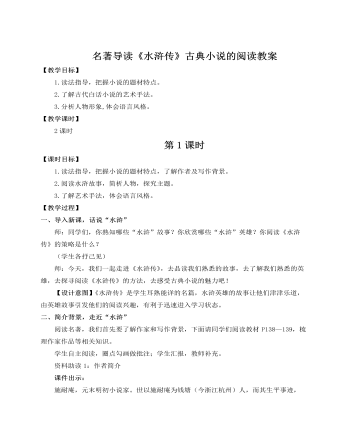
人教部编版语文九年级上册名著导读 《水浒传》 古典小说的阅读教案
《智取生辰纲》的核心人物是吴用和杨志,他们的对决实在精彩。杨志为了保住生辰纲可谓智计百出:他为了掩人耳目,故意不多带兵,“智藏行踪”;离京五七日后杨志对时间调整,由五更起日中歇,变为辰牌起申时歇,这说明他小心谨慎,“智变行辰”;放着宽平的官道不走,净找些偏僻崎岖的小径自讨苦吃,这样难走的路径,恐怕连歹人也不愿走,“智选路径”。这些行为可见杨志精明多智。可是吴用竟然道高一尺,制订软取计划,充分考虑时、地、人三个因素:天气炎热,押运者必有懈怠之处,利用天时,以药酒作为武器;黄泥冈为必经之途,人烟稀少,易于动作,于此设伏,占有地利;杨志为人精细,武艺高强,如果硬取一时未必得手,即使得手也未必能顺利脱身。所以吴用完全围绕杨志实施软取计划。①乔装歇凉黄泥冈贩枣客,麻痹杨志一行。②白胜挑酒故意不卖,贩枣人买下一桶,当面吃尽,显示酒中无药,迷惑杨志一行。③在另一桶舀酒,一人抢吃一瓢,一人再来桶里舀酒,巧下药,蒙骗杨志一行。④白胜赌气不卖,贩枣人好心调解,引诱杨志一行。以上计划,皆是吴用精心设计。精明如杨志,亦不能不中其计。实在精彩啊!
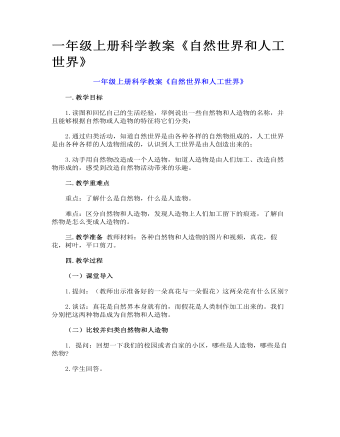
一年级上册科学教案《自然世界和人工世界》
把自然物改造成人造物 1.提问:请小组展示作品,并请别的同学推想这件作品是怎样被改造出来的?我们改造后的树叶是什么样子的?而改造前的树叶又是什么样子的?(教师引导学生思考并说出自然物变成人造物的过程,采用倒推的方式,结合现实中的人造物,去推想制成它的原材料,以及这些原材料在自然界中本来的样子。) 2.提问:生活中还有哪些物品,由自然物被制造成了人造物。(如:演示经过加工变成了石碑或石雕;木头经过加工变成了木槌;兽皮经过加工变成了皮衣等等)
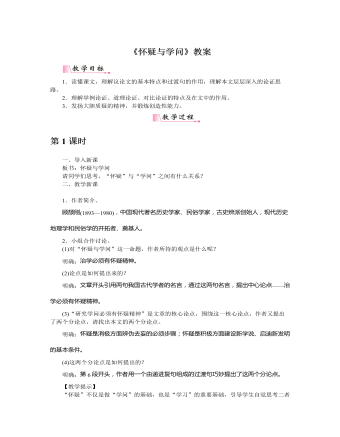
部编版语文九年级上册《怀疑与学问》教案
一、复习回顾、引入新课上节课,我们学习了《怀疑与学问》的内容,也学习了议论文结构的基本特征以及常用的论证方法,这节课我们重点学习议论文在论证论点过程中说理的层次,还要进一步理解议论文分析事理透辟,语言严密的特点。二、教学新课目标导学一:探究说理的层次,明确各段之间的关系请同学们细读课文,边读边思考句与句之间的关系,分组完成以下问题。1.本文论点是“治学必须有怀疑精神”,作者是如何阐述怀疑精神的?明确:对怀疑精神作者阐述得明确而透彻:所谓疑就是决不轻信,经过思考,分清是非,再决定信与不信;进而把怀疑科学地分为“怀疑”“思索”“辨别”三步。2.结合课文思考:作者是如何阐述“从怀疑到创新”这一治学过程的?明确:作者在进一步论证“怀疑是建设新学说、启迪新发明的基本条件”时,又把怀疑到创新的治学过程分析为“怀疑、辩论、评判、修正、创新”。作者通过举例、正反说理,使内容阐述得鞭辟入里,无懈可击。
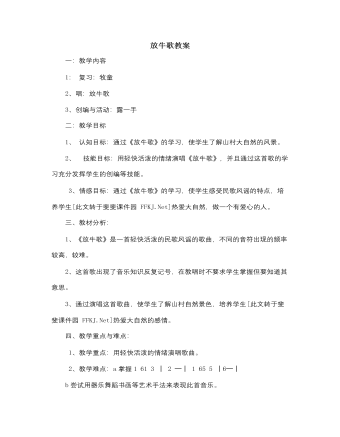
人音版小学音乐一年级下放牛歌教案
你能不能用你的本领把这山村美景表达出来呢? 老师请画画的小朋友在这花丛里,写诗的在小山坡上……….. 四、完美结课: 小朋友玩的高兴吗?好我们一起回家啦!(播放《郊游》)。 教学反思: 启发学生“你都想到了什么?”从而让学生展开丰富的想象,经过教师的简单小结使学生了解了牧童的生活和放牧时的心情,为学唱歌曲《放牛歌》做情感铺垫。 接下来的“体验理解”环节还是以激发学生兴趣为主,从猜小牧童的“宝贝”(笛子)模仿小牧童吹笛子的动作,到学吹笛子的有节奏的嘀嘀声XXXXXX,到有节奏的模仿小黄牛的叫声X-,我都是在让学生从间奏入手的,目的:一是引导学生会听音乐,能听出哪是间奏;二是让学生充分感受歌曲的旋律,熟悉歌曲;三是培养学生[此文转于斐斐课件园 FFKJ.Net]节奏感,知道笛声和小黄牛的叫声表示的节奏是什么,对两个声部的节奏训练进行一次渗透和尝试。
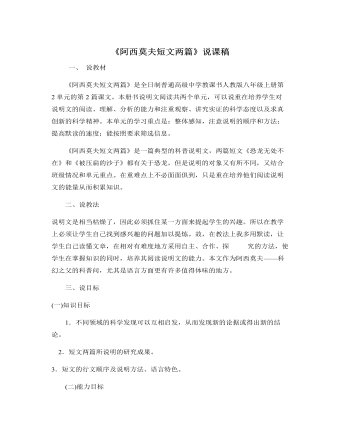
部编版语文八年级下册《阿西莫夫短文两篇》说课稿
一、 说教材《阿西莫夫短文两篇》是全日制普通高级中学教课书人教版八年级上册第2单元的第2篇课文。本册书说明文阅读共两个单元,可以说重在培养学生对说明文的阅读、理解、分析的能力和注重观察、讲究实证的科学态度以及求真创新的科学精神。本单元的学习重点是:整体感知,注意说明的顺序和方法;提高默读的速度;能按照要求筛选信息。《阿西莫夫短文两篇》是一篇典型的科普说明文,两篇短文《恐龙无处不在》和《被压扁的沙子》都有关于恐龙,但是说明的对象又有所不同,又结合班级情况和单元重点。在重难点上不必面面俱到,只是重在培养他们阅读说明文的能量从而积累知识。二、说教法说明文是相当枯燥了,因此必须抓住某一方面来提起学生的兴趣。所以在教学上必须让学生自己找到感兴趣的问题加以提炼。故,在教法上我多用默读,让学生自己读懂文章,在相对有难度地方采用自主、合作、探 究的方法,使学生在掌握知识的同时,培养其阅读说明文的能力。
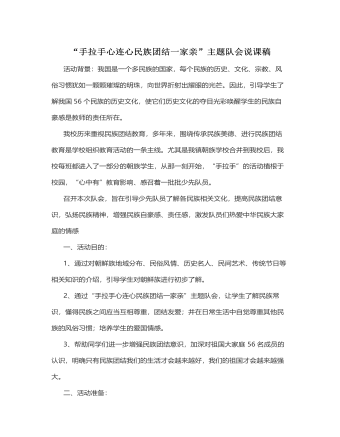
“手拉手心连心?民族团结一家亲”主题队会说课稿
2、畅谈如何做好民族团结(伴随韩红唱的《天路》,)首先由学生讲解关于民族团结方面的故事《孔繁森的故事》,作为一名小学生,我们时刻要做到民族团结,让民族团结在我们的心里生根发芽开花结果,谁来说一说在学习和生活中你是怎样做的?在学生讲故事的过程中,其他同学一边听一边受到感染,体会民族团结的温暖和重要性。畅谈中学生更加深刻感受到各民族之间应该像家庭中的兄弟姐妹一样心连心。3、赠礼在朝族小朋友被分到我班后,我们就确定了每个人都有自己手拉手的好朋友,我们班的汉族同学特意为他们的手拉手好朋友准备了自制的结对卡和小礼物。赠礼后朝族小朋友教汉族小朋友跳起了朝族舞蹈。4、快板《了不起》赞美祖国万里河山的锦绣,日新月异的变化,以及各民族团结一心建设祖国取得的成就。再一次让学生感受到民族团结的重要以及对伟大祖国的爱。
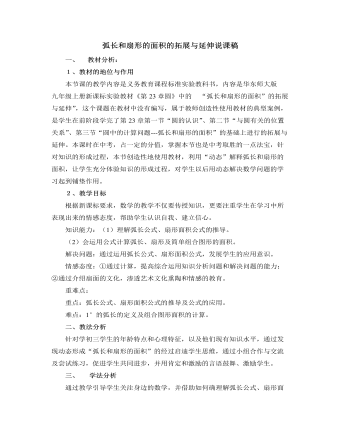
北师大版初中数学九年级下册弧长和扇形的面积的拓展与延伸说课稿
五、教学反思:时钟的秒针、分针、时针扫的图形, 汽车挡风玻璃的刮水器;刷工人刷过的面积近似看为扇形。圆中的计算问题---弧长和扇形的面积,虽然新课标、新教材要求学习,但本节教师结合学生的实际要求,将其作为内容进行拓展与延伸,具有一定的实际意义。用生活中动态几何解释扇形,体验解决问题策略的多样性,发展实践能力与创新精神。本节课,教师通过“扇子”的问题情景引入新课,它蕴含了大量的情感信息,有效激发学生的求知欲望,充分调动学生的学习积极性,注重学生的参与,让出时间与空间由学生动手实践,鼓励学生自主探索、合作交流、展示成果,提高了学生发现问题、提出问题、解决问题的能力。用“扇子变化”,帮助学生探索自然界中事物的动静结合问题,利用“扇子的文化”的新奇感激起学生的学习热情,陶冶了学生的学习情操,从而使学生更深切地理解问题,使原本单调枯燥的数学变得生动、形象,激发学生的情感,使课堂充满生机。
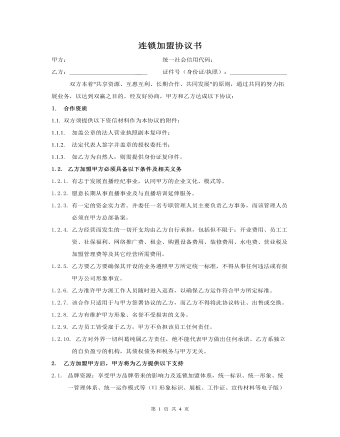
连锁加盟协议书
1.合作资质1.1.双方须提供以下资信材料作为本协议的附件:1.1.1.加盖公章的法人营业执照副本复印件;1.1.2.法定代表人签字并盖章的授权委托书;1.1.3.如乙方为自然人,则需提供身份证复印件。1.2.乙方加盟甲方必须具备以下条件及相关义务1.2.1.有志于发展直播经纪事业,认同甲方的企业文化、模式等。1.2.2.愿意长期从事直播事业及与直播培训延伸服务。1.2.3.有一定的资金实力者。并委任一名专职管理人员主要负责乙方事务,而该管理人员必须在甲方总部备案。1.2.4.乙方经营而发生的一切开支均由乙方自行承担,包括但不限于:开业费用、员工工资、社保福利、网络推广费、租金、购置设备费用、装修费用、水电费、营业税及加盟管理费等及其它经营所需费用。1.2.5.乙方要乙方要确保其开设的业务遵照甲方所定统一标准,不得从事任何违法或有损甲方公司形象事宜。1.2.6.乙方准许甲方派工作人员随时进入巡查,以确保乙方运作符合甲方所定标准。1.2.7.该合作只适用于与甲方签署协议的乙方,而乙方不得将此协议转让、出售或交换。1.2.8.乙方有维护甲方形象、名誉不受损害的义务。
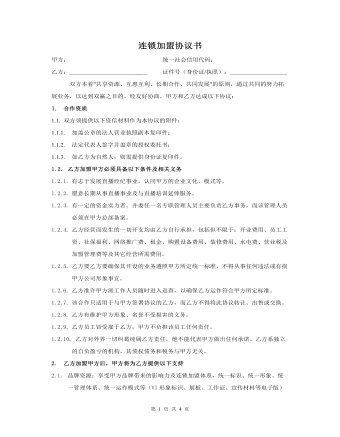
连锁加盟协议书
双方本着"共享资源、互惠互利、长期合作、共同发展"的原则,通过共同的努力拓展业务,以达到双赢之目的。经友好协商,甲方和乙方达成以下协议:1.合作资质1.1.双方须提供以下资信材料作为本协议的附件:1.1.1.加盖公章的法人营业执照副本复印件;1.1.2.法定代表人签字并盖章的授权委托书;1.1.3.如乙方为自然人,则需提供身份证复印件。1.2.乙方加盟甲方必须具备以下条件及相关义务1.2.1.有志于发展直播经纪事业,认同甲方的企业文化、模式等。1.2.2.愿意长期从事直播事业及与直播培训延伸服务。1.2.3.有一定的资金实力者。并委任一名专职管理人员主要负责乙方事务,而该管理人员必须在甲方总部备案。1.2.4.乙方经营而发生的一切开支均由乙方自行承担,包括但不限于:开业费用、员工工资、社保福利、网络推广费、租金、购置设备费用、装修费用、水电费、营业税及加盟管理费等及其它经营所需费用。1.2.5.乙方要乙方要确保其开设的业务遵照甲方所定统一标准,不得从事任何违法或有损甲方公司形象事宜。
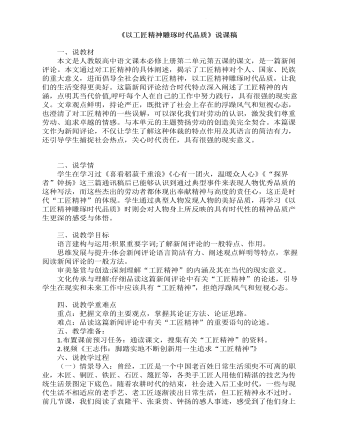
《以工匠精神雕琢时代品质》说课稿 2022-2023学年统编版高中语文必修上册
答案:铜车马的辉煌,来自原料的精挑细选、工艺的精巧极致和工匠的精心雕琢。可以说,是精益求精的工匠精神锻造出了“青铜之冠”的铜车马。2.“工匠精神”如此重要,那么,你认为“工匠精神”有着怎样的现实意义?观点一:工匠精神在企业层面,可以认为是企业精神。具体而言,表现在以下几个方面。第一,创新是企业不断发展的精神内核。第二,敬业是企业领导者精神的动力。第三,执着是企业走得长久的底气。改革开放40 多年来,我国涌现出大批有工匠精神的企业,但也有一些企业缺乏企业精神,只追求“短平快”的经济效益。这正是经济发展的隐忧所在。观点二:工匠精神在员工层面,就是一-种认真精神、敬业精神。其核心是: 不仅仅把工作当作赚钱养家糊口的工具,而是树立起对职业敬畏、对工作执着、对产品负责的态度,极度注重细节,不断追求完美和极致,给客户无可挑剔的体验。我国制造业存在大而不强、产品档次整体不高、自主创新能力较弱等现象,多少与工匠精神稀缺、“差不多精神”有关。

人教版新目标初中英语七年级下册How was your weekend教案2篇
Teaching Goal:1. General aims:Talk about recent past events2. Particular aims:A. Language Focus.Talk about recent past events and think of the past events.B. Language goalsHow was….?It was …What did …do over the weekend?C. Language structures:(1). How was your weekend? I was great. Pay attention to no form.(2). What did you do over the weekend? I played soccer. We went to the beach.D. Useful words and phrases:Words: was, did, went, beach, over, project, test, wasn’t, false, number, geography, spend, week, most, mixture, their, had, little, cook, read, saw, change, everyone, sit, sat, no, anythingPhrases: did one’s homework, played soccer, cleaned my room, went to the beach, played tennis, went to the movies, on Saturday morning, over the weekend, cook … for, what about, do some reading, have a party, talk show, go shoppingE. Grammar language:Present simple past tenseRegular and irregular verbsF. Learning strategies:Tour and holidaysG. Interdiscipinary:H. Emotion and manner:Teaching time: 5 periodsTeaching procedures:Period One教学步骤、时间 教师活动 学生活动 媒体应用Step 1Free talk 3’ Ask some questions like:Who’s on duty today?What’s the weather like? Answer and talk about something.让同学们回答下列问题1. Do you like weekend? (Let some students answer)It takes them three minutes to talk about the question.2. Why do you like weekend? (let the students answer) Most of the students like the weekend此时教师用汉语问:“在周末期间问你干了什么?这句话用英语这么回答?Let the students guess.At last the teacher give them right answer3. What did you do over the weekend?(板书、学习)

人教版新目标初中英语七年级下册Where is the post office教案2篇
Period 2 (3a----Section B 2c)Preview(Pre-task): Key points: What laAdd another information about their pen pals----their language on the cardnguage does she/he speak?She/He speaks....Does she/he have any brothers and sisters? Does she/he speak English?Preview(Pre-task): Add another information about their pen pals----their language on the cardKey points: What language does she/he speak?She/He speaks....Does she/he have any brothers and sisters? Does she/he speak English?Step 1 Revision1.Revisionand dictation of the new words 2.Revise the drills they learned yesterday.(by pairwork and grammar exercise)Step 2 Leading-inT has a conversation with one student. The conversation is following:---Do you have a pen pal?---Yes, I do.---What's your pen pal's name? ---His/Her name is....---Where is your pen pal from? ---He/She is from...---Where does he/she live? ---He/She lives in....---What language does he/she speak?He/She speaks...Write the new words on the Bb. They are following: EnglishChineseJapaneseFrenchStep 3 LearnLearn the new words with the whole class.Finish 3a with the students3b Pairwork T still does an example with one student Then the Ss practise in pairs. The example is following:--Curry Muray is my pen pal. He is from the United States.---What language does he speak?
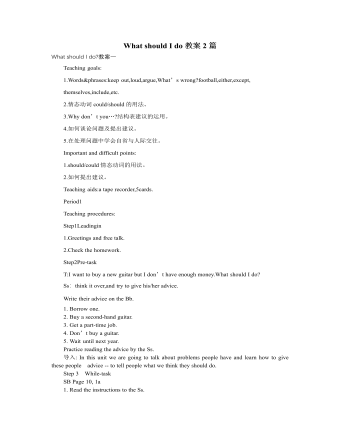
人教版新目标初中英语八年级下册What should I do教案2篇
说明:在帮Li Lei提建议的同时,教育学生如何学好英语。第三课时教学目标1. 语言目标:a) 词汇: Original, in style, haircut, the same as.b) 语言结构:My friend wears the same clothes and has the same haircut as I do.2. 能力目标:大多数学生能够谈论自己喜欢哪种服装,提高查找信息的能力。3. 情感目标:学会如何与朋友相处,要有自己对时尚的看法。教学重点掌握一些重要词汇。教学难点学会谈论问题,并能提出书面建议。◆教学突破首先针对Erin的问题,提出个人的建议,模仿2c部分的对话展开双人交际Pair-work;听老师诵读3a部分的信件,并找出LEFT OUT的问题所在;学生完成3b部分的内容,给Left Out提出书面的建议;学以口头形式提出自己目前存在的某个问题,讲给大家听,让同学们给自己提出一个建议,并作笔录;学生两、三个人分成一组,随意性地进行口语交际,谈论P14的第4部分的某个问题,相互交换意见。
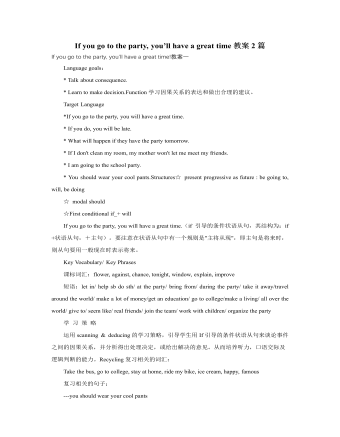
人教版新目标初中英语八年级下册If you go to the party, you’ll have a great time教案2篇
区分宾语从句、定于从句和状语从句宾语从句和状语从句,都叫做主从复合句。宾语从句主要是中考必考的,是初中阶段必掌握的从句,宾语从句主要是掌握三要素,所谓宾语从句,就是宾语在主从复合句当中充当宾语的一个句子,叫做宾语从句。主句的谓语动词是及物动词,后面如果是词或者是短语的话,是简单句,如果是句子的话,肯定是宾语从句。I know that he good at English.就是宾语从句,三要素,一要素是要注意连词,连词一共学了三类连词,一类连词是that口语当中可以省略,就像刚才说的那一句,I hear he is good at English.还有疑问代词、疑问副词,how where when,疑问代词、疑问副词。还有一类连词weather是否的意思,不是状语从句当中的如果,这一定要和如果区分开,这是是否。I don't know if he interested at English。宾语从句要注意if是连词。第二要素是语序,要用陈述举语序。比如说你家有几口人,我们都说How many people are there in you family?但是这是简单句,一旦说成宾语从句,你可以告诉我你家有几口人吗?Could you tell me how many people there are in you family ?

人教版新目标初中英语八年级下册He said I was hard-working教案2篇
This activity introduces some new vocabulary and provide oral practice using the target language.Task 1 . Ask four students to stand in front of the class, and the teacher asks them the following questions as a reporter.1.What are you going to do when you grow up?2.What are you going to do next week?3.What are going to do after school?The students will give different answers, then ask a good student to report what they said.I am going to e a doctor.What did she say?----------She said she was going to be a doctor.I am going to have a party on Friday night.What did he say?-------He said he was going to have a party on Friday night.I am going to do my homework.What did she say ?------ She said she was going to do her homework.I am going home after school.What did she say?-----She said she was going home after school.Say In this unit we are going to learn to use words like to report what someone said.Task 2. Read the instructions. Then ask a student to read the four questions. And write the words on the Bb. Explain what soap opera is.Task 3. Ask the students to Look at the pictures, point out the TV screens in the picture. Ask one girl to read what Marcia said.What did Marcia say? She said She said she was having a surprise party for Lana on Friday night. Repeat the other pictures in the same way.Activity3. Listen and number the pictures in activity 1a.
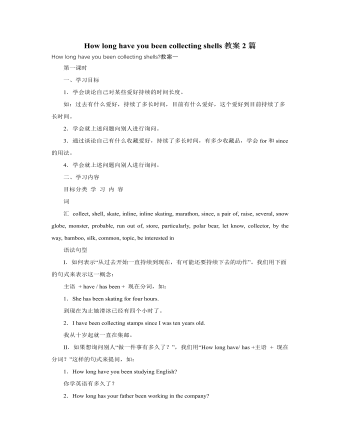
人教版新目标初中英语八年级下册How long have you been collecting shells教案2篇
Step Ⅱ Show the new words on the screen and teach the new words. Read the new words to students and ask them to repeat.Step Ⅲ 3aThis activity introduces new vocabulary and provides reading practice using the target language.In this activity first look at the four pictures.T: What can you see in the pictures?Ss: Four snow globes.T: Right. There are four snow globes in the pictures. And what are they?Ss: They are a monster, two polar bears, two penguins and a birthday cake.Write these words on the blackboard: snow globe; monster; polar bear; penguin and birthday cake. Read them to the class and ask students to repeat each one. Make sure students understand each word.Use a computer to show the E-mail message on the screen and read the message to students.Get students to read the e-mail on their own, and then draw lines connecting each snow globe and its description.Correct the answers.AnswersA line should connect each snow globe picture with the words that describe it in the letter.Step Ⅳ 3bThis activity provides writing practice using the target language.First review Activity 2a on Page 47.Then ask students to complete the message according to Activity 2a.Some partial sentences are given to students. Write about one person's collection.When students work, walk around the room checking the progress and offering help as needed.When they finish, ask some students to read their messages to the class.

人教版新目标初中英语八年级下册What were you doing when the UFO arrived教案2篇
(一).知识方面: 1.培养学生能运用过去进行时来描述、谈论过去某个时间正在发生的事情或动作的意识和能力,能就过去某个时间正在发生的动作做出正确的描述。 2.培养学生的想象力和角色扮演的合作能力。 3.培养学生讲述过去发生的事情经过的能力。能正确运用一般过去时来讲述故事。 (二).技能方面: 1.本单元的语言目标是Talk about past events and tell a story(谈论过去的时间和讲述一个故事),围绕这一目标,要涉及句型: What were you doing when the UFO arrived? ----I was sitting in the barber’s chair. The barber was cutting my hair. 因此必须学习standing、studying、cleaning、sleeping、cooking、making、eating、cutting、等表示地点的词,以便为上述句型提供语言材料。2.学习过去进行时的有关知识。Was/were+现在分词,是该时态的表达式。 3.在学习过程中,要区分The boy was walking down the street when the UFO landed.和While the boy was walking down the street, the UFO landed.这两种由when和while引导的状语从句的句型结构。注意它们的不同。
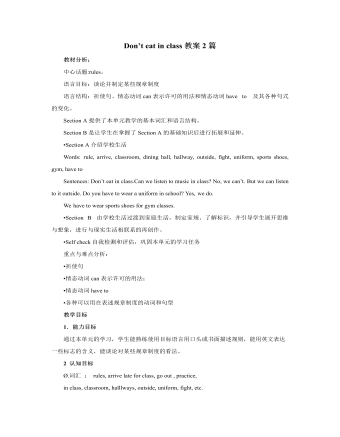
人教版新目标初中英语七年级下册Don’t eat in class教案2篇
Don’t fight. =You can’t fight. (板书,教读)教师把这些句子板书在黑板上,并请学生大声整齐地读祈使句和“can’t”句型,并让学生注意两种句型表达形式的不同和转换,“Don’t …=You can’t…”;并对学生说:These are our school rules. (板书,教读) You can’t break the school rules. Don’t break the school rules.(板书,教读)步骤3 :Practicea. T: Now, each of the students is breaking one of these rules.Please finish 1a.学生看图,完成1a的内容,检查答案并大声朗读校规。b. 听录音,完成1b,选出四位学生都违反了哪条校规;听之前,学生要读会英文名。c. 请两位学生朗读1c部分的句型;要求学生两人一组对话表演,SA扮演外校转来新生,SB告知本校校规。(学生可经过讨论,多说出他们想到的校规,不必只限于书上;教师应给予帮助)2) 第二课时(2a~4)步骤1 :warming up of revisionT: What are the rules at your school?学生使用“can”或祈使句表达各条校规;其中老师可引出“eat in the cafeteria outside”的表达。步骤2 :Practicea.T: Christina is an exchange student. She doesn’t know the rules. Let’s listen, what activities they’re talking about?学生听第一遍时,完成2a;第二遍时,完成2b;b. 请学生领读2c部分,看着2a完成的表格,理解2c活动的要求;分成小组针对2a进行问答;
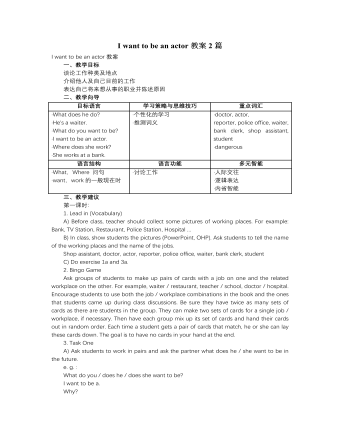
人教版新目标初中英语七年级下册I want to be an actor教案2篇
三、教学建议第一课时:1. Lead in (Vocabulary)A) Before class, teacher should collect some pictures of working places. For example: Bank, TV Station, Restaurant, Police Station, Hospital ...B) In class, show students the pictures (PowerPoint, OHP). Ask students to tell the name of the working places and the name of the jobs.Shop assistant, doctor, actor, reporter, police office, waiter, bank clerk, studentC) Do exercise 1a and 3a.2. Bingo GameAsk groups of students to make up pairs of cards with a job on one and the related workplace on the other. For example, waiter / restaurant, teacher / school, doctor / hospital. Encourage students to use both the job / workplace combinations in the book and the ones that students came up during class discussions. Be sure they have twice as many sets of cards as there are students in the group. They can make two sets of cards for a single job / workplace, if necessary. Then have each group mix up its set of cards and hand their cards out in random order. Each time a student gets a pair of cards that match, he or she can lay these cards down. The goal is to have no cards in your hand at the end.3. Task OneA) Ask students to work in pairs and ask the partner what does he / she want to be in the future.e. g. :What do you / does he / does she want to be?I want to be a.Why?Because it's (adj).B) Vocabulary: Section B, 1a4. Homework 1.2.



